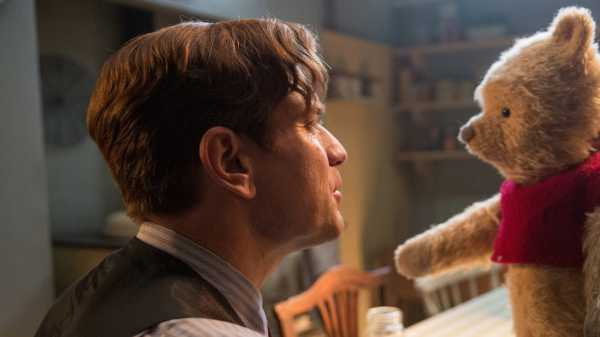
In “The House at Pooh Corner,” A. A. Milne’s last book about Christopher Robin, the mop-haired boy bids farewell to Winnie-the-Pooh, the endearingly befuddled and honey-besotted bear. It is a bittersweet encounter. As they reflect on life and more, Christopher Robin muses that what he likes doing best is nothing. “It means just going along, listening to all the things you can’t hear, and not bothering,” he tells Pooh. But he adds, wistfully, that he can’t do nothing anymore. The time has come. The boy makes the bear promise never, ever to forget him, even when they grow old. Pooh promises. This marks the end of Christopher Robin’s enchanted childhood.
Ninety years later, the film “Christopher Robin” again captures the tender melancholy of transition. It’s a delicious movie to see in these last, lazy days of August, when summer has slowed not quite to nothingness but at least to the bliss of a warm day that begins with a bird’s morning song and ends without a worry as to what work has not been done by dusk. The film, which was directed by Marc Forster (“The Kite Runner,” “Finding Neverland”), has adapted Milne’s reflections about what it is to live, reflections that seem—for both adults and children, in this exhaustingly fraught era—all the more relevant.
“Christopher Robin,” unlike last year’s poignant and profound “Goodbye Christopher Robin,” is not a biographical film about Milne and his son, after whom the character was named. Instead, it features a fantastical story line in which the Christopher Robin of the books goes off to boarding school, serves in the Second World War, gets married, and has a child. Now an adult (played by an earnest Ewan McGregor), he faces real-world challenges as a frazzled efficiency expert at a struggling company in postwar London. In the clamor of work, he has lost a sense of connection to his wife; to his young daughter, Madeline; and to life itself. “Nothing comes from nothing” is his philosophy now. Christopher has even forgotten Pooh.
But the bear reappears, by timely happenstance, and bumps into Christopher in a London park. Pooh is gleeful; Christopher is not. He tells Pooh that he hasn’t thought about the Hundred Acre Wood or its denizens in thirty years. “Did you let me go?” Pooh asks at one point. “I suppose I did,” Christopher concedes.
Now a man in a different stage of life, Christopher wants to return Pooh quickly to the Hundred Acre Wood, in Sussex, so that he can get back to crunching numbers for his company. He repeatedly disavows the simple pleasures and principles by which he once lived. But Pooh, despite being a self-described bear of little brain, keeps steering us back to what is important. “There’s more to life than balloons and honey,” Christopher says. “Are you sure?” Pooh replies. Their back-and-forth permeates—and directs—the story. As they travel, Christopher tries to hide Pooh under his coat, in a telephone booth, and amid crowds. “People don’t like things that are different,” Christopher says. “So I shouldn’t be me?” Pooh asks.
The story’s twists and subplots incorporate Christopher’s other old friends—Piglet, Eeyore, Tigger, Owl, Rabbit, Kanga, and baby Roo. Jim Cummings provides Pooh’s voice—Tigger’s, too—and captures both the woes and simple wonderment of the portly little bear. Brad Garrett is perfect as the ever grumbling Eeyore. “Headed for the waterfall. I’ll be gone soon,” Eeyore says, gloomily, at one point, as he floats helplessly down a stream. “Not that anyone will notice. Just have to go with the flow.”
In fact, the voice actors give the strongest performances in the film. Thanks to some terrific C.G.I., Pooh and his cohort blend seamlessly into Christopher’s real world, and they are visually more appealing, and truer to E. H. Shepard’s early illustrations, than recent cartoon versions of Winnie-the-Pooh. I’ve visited the original stuffed animals, which Christopher Robin Milne bequeathed to the New York Public Library. They reside today in a special section of the Children’s Center, with a painting of the Hundred Acre Wood behind them. I recognized those toys’ worn fuzziness and warm expressions in the characters of this film.
In the movie, Christopher and Pooh share new adventures—getting lost in the fog of a forest, confronting the feared Heffalumps and Woozles, finding a way to salvage Christopher’s company—that each symbolize life’s bigger challenges. The movie is whimsical but subtly value-laden, pro-labor and anti-bullying. It carries a message about mindfulness and the strength of the human spirit. And, along the way, Christopher and Pooh rekindle their connection. “I’m not who I used to be. I’m lost,” the man confesses to his childhood chum. “You need to remember who you are,” Pooh replies. He invokes the theory of nothingness. “People say nothing is impossible, but I do nothing every day,” Pooh says. “Doing nothing often leads to the very best of something.”
The exchange reminded me of what Benjamin Hoff wrote in “The Tao of Pooh,” in 1982, to explain why Milne’s little bear was one of the world’s great Taoist masters. “While Eeyore frets and Piglet hesitates and Rabbit calculates and Owl pontificates, Pooh just is. And that’s his clue to the secret wisdom of the Taoists,” Hoff wrote. “When you discard arrogance, complexity, and a few other things that get in the way, sooner or later you will discover that simple, childlike, and mysterious secret known to those of the Uncarved Block: Life is fun.”
Pooh puts it succinctly in “Christopher Robin”: “There’s always time for a smackeral of wonder.” But it was another line that stuck with me, about the passage of childhood, of summer’s simplicity, and of life’s innocence. “I would have liked it to go on longer,” Pooh muses. Wouldn’t we all.
Sourse: newyorker.com






